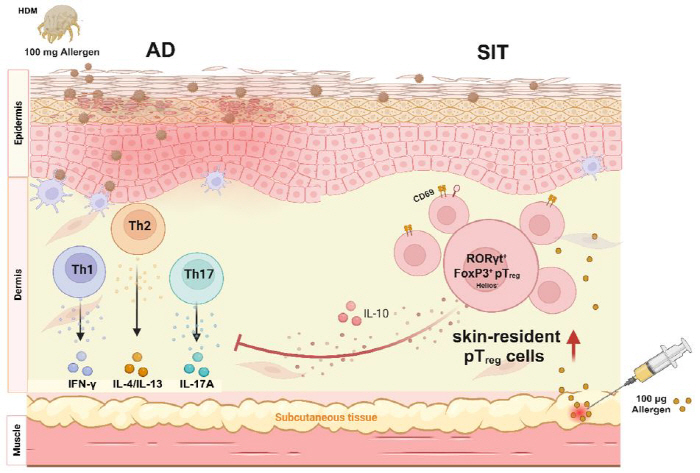Identifying Cells Mediating the Effect of Immunotherapy for Atopic Dermatitis...Specific regulatory T cells inhibit pathogenic immune cell activity
|
A research team led by Park Chang-wook, a dermatologist at Severance Hospital, Park Jung-won, a professor of pediatric respiratory allergies, Sohn Myung-hyun, a doctor at Yonsei University Medical School, Kwon Ho-geun, a professor at the Misaeng School, and Lee Kwang-hoon, an honorary professor at Yonsei University, announced on the 13th that if certain regulatory T cells are expressed during atopic dermatitis immunotherapy, they suppress pathogenic immune cells and have excellent anti-inflammatory effects.
A typical cause of atopic dermatitis is the penetration of house dust mite allergens (allergy-inducing substances) into the damaged skin barrier. Afterwards, pathogenic T cells such as Th1, Th2, and Th17 are activated, inflammatory cytokines are secreted, and chronic inflammatory reactions occur. Pathogenic T cells are cells that originally protect the body, but malfunction and cause inflammation, and the activity of these cells is one of the mechanisms of atopic dermatitis.
Subcutaneous allergen-specific immunotherapy (SIT) used for atopic dermatitis is a treatment that makes the body familiar with allergens and prevents hypersensitivity reactions. Allergen is repeatedly injected under the skin by injection to activate regulatory T cells, which are immune cells that suppress allergic reactions.
The research team conducted an investigation to identify specific regulatory T cells that express the effect of allergen-specific immunotherapy.
The research team used atopic dermatitis patients and mouse models that responded to allergen-specific immunotherapy. The transcriptome was analyzed after separating regulatory T cells from peripheral blood mononuclear cells in the atopic dermatitis patient group that showed immunotherapy effects. The gene expression patterns and molecular features of regulatory T cells related to immunotherapy responses in transcripts were investigated.
Here, we found regulatory T cells expressing the transcription factor RORγt, which regulates the differentiation and function of T cells. In fact, RORγt expression was increased in mononuclear cells and regulatory T cells located in skin tissues of patients after immunotherapy. In the mouse model, the same RORγt expression-regulated T cells were accumulated in the skin, confirming their function.
We continued to study how expression-regulated T cells express immunotherapy effects. In mouse models, RORγt expression-regulated T cells inhibited pathogenic T-cell immune responses, revealing that the anti-inflammatory effect of the treatment appeared.
Professor Park Chang-wook said, "Understanding the diversity and function of immune cells present in the skin is the starting point for building a human skin immunization map and treating immune cells. We expect to contribute to improving the precision and efficiency of immune-based treatment for various inflammatory skin diseases including atopic dermatitis by identifying the mechanism of action of subcutaneous allergen-specific immunotherapy.".
Meanwhile, this study was conducted with the Ministry of Health and Welfare's research-oriented hospital and health care technology research and development projects and the support of the Korea Research Foundation's mid-sized research project, and the research results were recently published in the international journal Science Translational Medicine (IF 15.8)'.
|
This article was translated by Naver AI translator.





